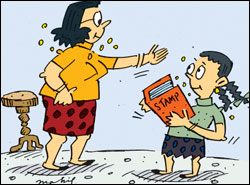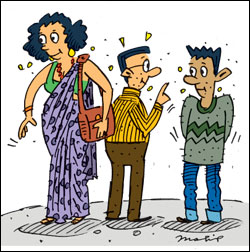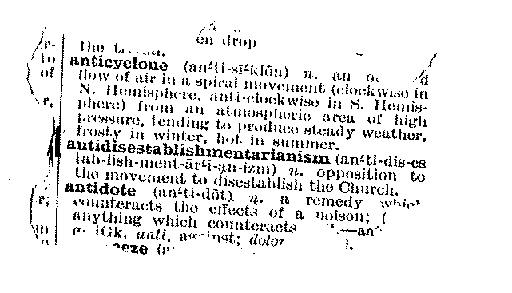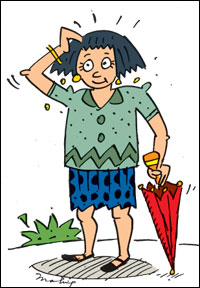|
 by R. S. Karunaratne
by R. S. Karunaratne
Usage of 'look'
Look is a regular verb:
Present tense: look
Past tense: looked
|

Let me look at your stamp
album. |
Past participle: looked
Here, look
means directing your eyes at somebody or something
Look at this map and tell me where Sri Lanka is.
Why are you looking at her?
She looked everywhere for her
pair of spectacles.
She blushed and looked away.
Look can be used as a noun.
Take a good look at this
car.
I want to have a look at the new house.
Sometimes,
look
at can mean 'read', examine or
consider.'
The interviewer had a look at
my CV (= curriculum vitae)
The Government is looking at the social implications of the new
regulations.
The publisher had a brief look at
my manuscript.
Look
can mean 'seem' or 'appear'
My sister looks like Kajol.
You look very tired.
She looks pale.
Looks as if we are going to
miss the train. (used in speech)
What does your boss look
like?
Some adverbs such as 'carefully,
closely, sternly, intently, longingly' are used with 'look'.
The principal looked at the student
sternly.
Before crossing the road, he looked
at the traffic carefully.
'Turn and 'let' are two verbs that
frequently occur with look
He turned to look in my
direction.
Let me look at your stamp
album.
Look is used with many phrasal verbs.
She looks after
her old parents. (= takes care)
|

Why are you looking at her?
|
Some local authorities do not look after
the needs of the people. (= be responsible)
Most of us look back on our
happy days. (=think about)
You must not look down on
poor people. (=treat them as inferior)
Many young graduates are looking
for employment (=trying to find)
We are looking forward to his
visit. (= we want it to happen)
A committee has been set up to look into
our grievances. (=find out)
Some people look on when an
innocent man is beaten. (=watch)
Look out! We're approaching a
tunnel. (=be careful)
We looked round the old
castle. (=walked round)
Some refugees look to the
future with a certain anxiety. (=think about)
Please look up the meaning of
'doodle' in the dictionary (=find out)
Young children look up to
their teachers. (=admire)
Current English usage
1. Per cent/percentage We use 'per cent' (as two words) when we talk
about fractions. 60 per cent of the voters do not want a change of
Government. 'Percentage' is a fraction expressed as a particular number
of hundredths. Australia has a high percentage of immigrants. 2. onto/on
to Ten school children got onto a bus. (= into) They climbed on to the
hill with great difficulty. (= meaning of the two words should be taken
separately) 3. Kind of/sort of are slang expressions. Instead, you can
use 'rather' or 'somewhat'. The new watcher looked rather old. I was
somewhat surprised to see him at the theatre. 4. as if/like He sings as
if he were a professional singer. (He is not a professional singer) You
are like your mother. (You resemble your mother) 5. 'Which of the two'
is followed by a singular verb. Which of the two boys is the stronger?
'Prevent' must be followed by 'from' Parents try to prevent their
children from telling lies. 7. 'as if' is followed by a verb in the past
tense. You speak as if you met the principal.
Longest English word?
|

The word as it appears in The New National Dictionary (Collins
London and Glasgow) |
There are many words in the English dictionary which you may not be
familiar with. Some of the words you come across may even be difficult
to pronounce, even though a guide to pronunciation has been given. Out
of all the words given in the dictionary what do you think is the
longest word? S.P. Kumarasinghe of Kirillawala, Weboda believes that the
longest English word, containing 28 letters is
ANTIDISESTABLISHMENTARIANISM. What do you think? And what does the word
mean? It is 'opposition to the movement to disestablish the Church.'He
had heard this word at a Spelling B Contest held at St. Servatius
College, Matara, conducted by the Director of Education, Matara Division
way back in the 60s and decided to share it with you today. However,
there is another word in the Chambers dictionery
Floccinaucinihilipilification (facetious) which means 'setting at little
or no value or at a trifle. It has 29 letters.So, why don't you check
out on some of the long words, containing more that 20 letters perhaps,
and familiarise yourselves with these jaw-breakers?
Starters:
Pronouns as
the subject
Pronouns are used in place of nouns. The following pronouns can be
used as the subject of a sentence.
I, you, he, she, it, we, they
|

Amanda took out her red umbrella and unfurled the umbrella. |
When you have to use 'I' and another
pronoun, put yourself last.
Nimmi and I went to school on Monday.
If you write: "I and Nimmi went to school on Monday," the sentence is
grammatically wrong.
Here is a paragraph written by a child. Help him to use pronouns
instead of repeating nouns in the sentences.
Original passage:
Amanda put on a wig. The wig was black. Amanda looked somewhat
younger than she really was. Amanda took out her red umbrella and
unfurled the umbrella. Amanda said, "Dilini you should go to school,"
Dilini said, "I don't feel well," Amanda asked "Do I look young?" Dilini
started laughing.
Passage re-written with pronouns:
Amanda put on a wig. It was black. She looked somewhat younger than
she really was. She took out her red umbrella and unfurled it. She said,
"Dilini should go to school." Dilini said, "I don't feel well," Amanda
asked, "Do I look young?" Dilini started laughing.
You will note that pronouns have not
been used in certain places to avoid confusion.. |

